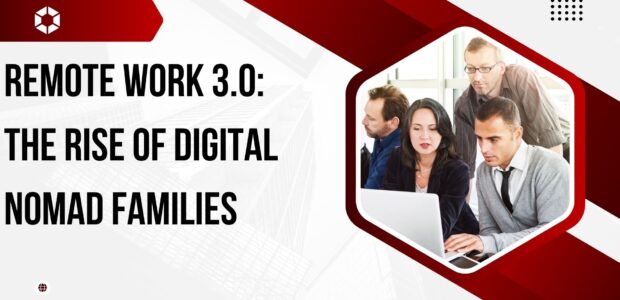Remote Work 3.0: The Rise of Digital Nomad Families
In the early days of remote work, it was freelancers on laptops at beach cafes. Then came the pandemic-era Zoom calls from home offices. Now, in 2025, we’ve entered Remote Work 3.0—and entire families are going nomadic.
What was once a lifestyle for solo adventurers is now a movement embraced by parents, kids, and multi-generational households. Welcome to the era of digital nomad families—where flexibility, freedom, and global living define the modern work-life balance.
This blog explores how families are living, working, and schooling around the world, the tools making it possible, and what this shift means for the future of work and parenting.
🧳 What Are Digital Nomad Families?
Digital nomad families are households—often with young children—who choose to live in multiple locations throughout the year, working and learning remotely. With the right tech, flexible employers, and an appetite for adventure, these families have swapped routine for mobility.
Think:
-
A designer mum working from a villa in Bali
-
A dad teaching coding from Lisbon
-
Kids attending online school from a beachside co-working café in Costa Rica
🌍 Why Families Are Going Nomadic in 2025
🕒 1. Work Flexibility Is the Norm
Remote-first companies are now standard. Teams work across time zones, and hybrid roles offer full autonomy. Parents are no longer tied to commutes or fixed office hours.
🏫 2. Education Has Gone Global
Online schools, pod-based learning, and travel-based curriculums (like “worldschooling”) allow kids to keep up academically while gaining real-world experience.
💸 3. Cost-Effective Living
Many nomadic families reduce costs by living in countries with a lower cost of living while earning in stronger currencies.
Example: Living in Thailand or Mexico while working for a UK or US employer.
🧘 4. Lifestyle Redesign
Parents are prioritising time with kids, exposure to nature, and cultural diversity over mortgage payments and after-school clubs.
🧰 How Families Are Making It Work
📡 1. Tech-Powered Productivity
Tools like Starlink, 5G routers, and noise-cancelling headphones ensure parents can work from almost anywhere. Video calls, project management apps (like Trello or Asana), and cloud-based systems keep things running smoothly.
🧑🏫 2. Flexible Learning Models
-
Online schools (e.g., Galileo, Khan World School)
-
Unschooling and child-led learning
-
Micro-schools and temporary co-op groups in nomad hubs
-
Parents often rotate teaching or hire online tutors
🧳 3. Travel and Visas
Countries like Portugal, Spain, Indonesia, and Costa Rica now offer digital nomad visas designed for families, with perks like healthcare access, legal schooling options, and tax incentives.
🏠 Where Digital Nomad Families Are Living
Top 2025 destinations for nomad families include:
-
Lisbon, Portugal – family-friendly, safe, with great infrastructure
-
Chiang Mai, Thailand – low cost, great schooling pods, strong nomad community
-
Mexico City or Oaxaca – culture-rich, vibrant communities, bilingual options
-
Cape Town, South Africa – nature, space, and remote work hubs
-
Bali, Indonesia – wellness lifestyle and expat networks
Many families do “slowmad” travel—staying 3–6 months per location to build routine and reduce burnout.
⚖️ Challenges of the Nomadic Family Life
-
Stability: Moving often can disrupt routines for kids and parents alike.
-
Healthcare: Access can vary, so many rely on international insurance.
-
Loneliness: Constant travel can limit long-term friendships.
-
Legal issues: Schooling, tax residency, and visa laws require careful planning.
Yet with structure, community, and preparation, many families find the benefits outweigh the hurdles.
👨👩👧 What This Means for the Future of Work & Parenting
The rise of digital nomad families is reshaping:
-
Employer policies: More firms offer location flexibility, remote stipends, and family-inclusive wellness programs.
-
Education models: Schools are moving online or modular, built to travel.
-
Housing and travel: Platforms now cater to nomad families (e.g., kid-friendly Airbnbs, remote school + stay packages).
As more parents reject the idea that they must choose between work and family time, Remote Work 3.0 is unlocking a new kind of success—measured in sunsets, shared meals, and global perspective.
💬 Final Thoughts
Digital nomad families are showing the world that you can raise children, grow a career, and see the world—all at once. They’re not escaping responsibility; they’re redefining it. By merging flexibility with intention, they’re crafting a life that’s rich in experience and rooted in values.
In 2025, the office is optional. The classroom is portable. And the world is home.


